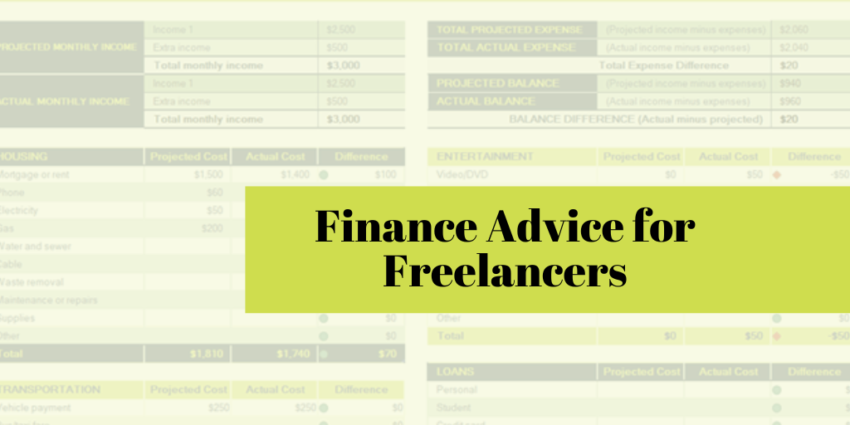I’m a freelance comics editor, a contrasting career to the other members of my immediate family—they all work at banks. One of the benefits of growing up in a financially literate family is that (while I’m not an expert), I have a bit more interest in managing personal finance than your average creative freelancer. I threw this together as a quick Twitter thread, but it seems like it resonated with folks there, so I’ve transferred it to an easier-to-read article. Thanks to Creator Resource for hosting it!
First of all, read Jim Zub’s enormously helpful guide to freelance taxes; it was indispensable to me when I was starting out as a freelancer.
Based on Jim’s advice, I created an Excel spreadsheet where I keep track of ALL payments and ALL expenses. I’ve uploaded a template version to my Google Drive.
Needless to say, the template is really basic, and over the years, I’ve customized it–you should too!
I invoice for my work using PDFs, so immediately when I send off an invoice, I add the PDF to my “invoices UNPAID” folder. When I receive the payment, I move the PDF to the PAID folder and input the amount I received on the spreadsheet. I like this system because it makes it very easy to keep track of what has and hasn’t been paid! Once or twice a month, I look at the unpaid invoices folder and follow up on any outstanding invoices.
When I receive a payment, I move 15% to a “freelance taxes” savings account, though Jim recommends setting aside 30%. Instead of the higher percentage, I toss $50 per month in there when I can, just to be safe. As a Canadian, I’ve begun to request cheques from international clients, which I deposit in a USD account. This saves everyone on PayPal or wire fees, and I get a more favourable exchange rate!
For expenses, I have a receipts folder in my Gmail AND a physical envelope. When I bring home a physical receipt, I write what it was for right on the receipt itself and pop it in the envelope. If I’m being responsible, I record the amount and expense in the spreadsheet right away, but I sometimes just empty all of the labelled receipts in my wallet into the envelope. I always find I missed adding a couple too the spreadsheet when I’m settling my receipts at the end of the year!
One thing to note is that you can expense MORE THAN YOU THINK! As Jim notes in the article above, anything that helps with work can be expensed: research (like comics or DVDs), travel, business dinners, office equipment, table supplies for conventions, even your rent & utilities can be partially expensed if you work from home!
But how do you calculate your tax, once you have all of this info recorded? I have an accountant now, but for years I found TurboTax to be a lifesaver! It walks you through everything, so you don’t miss any deductions, even for things outside your work, like charity donations. Best of all, you can claim the cost of the software (or your accountant) on your return the following year.
On a slightly different note, if you have the means, I highly recommend investing! Creator Resource interviewed Michelle Parker about this topic, it’s a fantastic starting point.
There’s almost no minimum on investing, so if you can put aside $10 a month into a separate, low or no fee savings account, once you have $100 you can start investing in mutual funds (which are lower risk than stocks).
Everyone’s situation is different, so it’s impossible to recommend a specific investment or savings plan, but it’s worth considering. If you have money coming in that’s just sitting in a chequing account, it’s not doing anything for you, but investing even small amounts will grow over time.
Another thing we do at home is create separate basic savings accounts for major purchases—a vacation, an emergency fund for our dog, my partner saved up for a PS5—and have automatic transfers that deposit small amounts every month. Savings accounts will usually have higher interest rates than chequing accounts, but often come with withdrawal fees, so these are a good option for accounts that you won’t be taking money out of all the time, so they’re perfect for when you need money to build up money over time.
If you can, setting up automatic transfers for regular payments—rent, phone, utilities, debt repayments, retirement fund contributions, etc.—will make your life a bit easier. But if that isn’t feasible, set up a recurring reminder in your calendar!
I also encourage you to take a look at the accounts (and credit cards) available from your financial institution to see if you’re getting the best possible products for you. Once every year or two, review your options and decide which balance of fees and perks best suit your needs. Lots of credit cards come with rewards and cash back options if you can meet the criteria for their use!
Additionally, it can be a pain to apply for everything, but rewards cards where you do a lot of shopping are a great way to save $10-20 here and there. Besides, they’re free. Just get them, keep up to date on them, take advantage of savings events when possible. Some examples that I use a lot: PC Optimum, Air Miles, Scene+, Expedia, and “buy 7 get one free” cards for at least 2 bubble tea shops.
There’s no one-size-fits-all approach to managing personal finance, and there is a lot more to be said on this topic. However, these are a few basics that have worked for me, and I hope they get you thinking about what small things habits you can build to make your own life easier during tax season.
- Finance Advice for Freelancers - November 21, 2022
